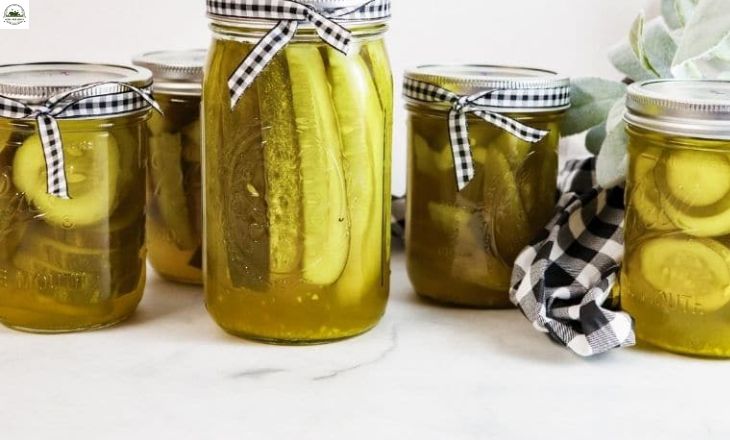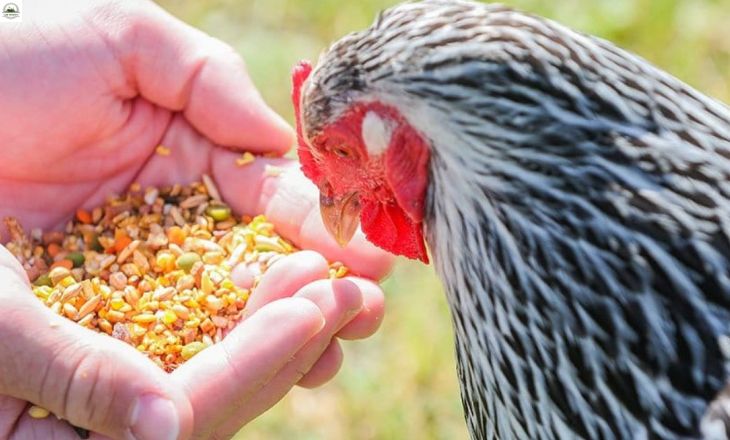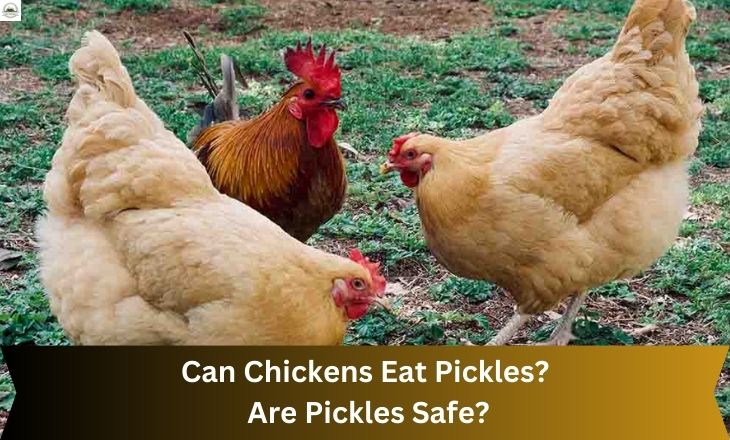As the age-old debate rages on over what’s fit for poultry consumption, one question continues to perplex backyard chicken keepers and curious pet owners alike: Can chickens eat pickles? The thought of these feathered creatures nibbling on tangy, briny cucumbers may seem absurd at first glance, but the truth behind this inquiry goes beyond mere curiosity.
Chickens are notorious for their insatiable appetites and seemingly indiscriminate palate, leading many to wonder if pickles could be a savory addition to their diet.
In this article, we delve into the intriguing world of chicken dietary habits and explore the surprising answer to whether or not these clucking companions can partake in everyone’s favorite fermented snack.
Prepare to be surprised as we unravel the mystery surrounding pickles and poultry palates!
Can Chickens Eat Pickles? The Short Answer
In brief, chickens can consume pickles, but giving them as a regular treat is not advisable. The reason is that pickles have excessive salt and preservatives, which can be detrimental to chickens if consumed in large amounts.
What Are Pickles?
Before we delve into why chickens should avoid consuming pickles, let’s look at the components that constitute a pickle.
- Cucumbers: Cucumbers are a nutritious and hydrating snack that chickens can enjoy without harm.
- Dill: Dill, an herb safe for chickens to consume, offers potential health benefits, including support for respiratory health and antioxidant properties.
- Vinegar: Were you aware that vinegar is suitable for chickens? It can also be included in the flock’s water to enhance their health.
- Salt: Although salt is not harmful to chickens, overconsumption can lead to severe health problems.
- Water: Minimal quantities of water are employed to preserve the pickles’ moisture during the jarring process.
- Sugar or other sweeteners: While not essential, it is pretty typical for pickling spices and liquid to include a certain amount of sugar to mitigate acidity and enhance the overall flavor.
The Dangers of Salt and Preservatives for Chickens
While chickens can eat dill pickles, it’s not the healthiest choice. The high salt in pickles can harm their stomachs and make them thirsty.
Also, the strong taste of dill pickles might not be good for some chickens, and they might not want to eat their regular food.
Instead of dill pickles, you can give your chickens fresh herbs like parsley or basil, which are suitable for them and won’t make them sick.
Chicken owners should be cautious about what they give their chickens and only treat them occasionally while ensuring they eat their regular food.
Can Chickens Eat Dill Pickles?
While chickens can eat dill pickles, it’s not the healthiest choice. The high salt in pickles can harm their stomachs and make them thirsty. Also, the strong taste of dill pickles might not be good for some chickens, and they might not want to eat their regular food.

Health Benefits of Dill Pickles for Chickens
Dill pickles are not only tasty for humans but also have health benefits for chickens. They are high in vitamins and minerals like vitamin K and calcium, strengthening chickens’ bones and keeping them healthy. The pickling process helps with gut health by giving chickens helpful probiotics, which help with digestion and nutrient absorption. Dill pickles also have antioxidants to help chickens’ immune systems fight diseases.
The electrolytes in dill pickles are good for chickens in hot weather because they help keep them hydrated. By giving chickens dill pickles in moderation, owners can help keep their birds healthy and add some variety to their diet.
Feeding Pickles to Chickens: In Moderation
Chickens might enjoy eating pickles, but giving them only a little is best. Pickles have salt that can make chickens sick if they eat too much. Instead of pickles, feeding chickens a mix of grains, seeds, and fresh veggies is better. Too many pickles can upset a chicken’s stomach and cause health problems.
So, it’s important to be careful and feed chickens healthy food for their well-being.
Alternatives to Pickles for Your Chickens
If your hens are bored with their usual pickles, numerous other snacks are available to ensure their contentment and well-being.
- Vegetables: Chickens enjoy eating lettuce, kale, turnip greens, and chard because these leafy greens help keep them healthy with vitamins and minerals.
- Fruits: Chickens can eat watermelon, strawberries, and blueberries as healthy snacks in moderation. These fruits provide important vitamins for the chickens to stay healthy.
- Grains: Corn and sorghum are both good energy sources for chickens. They have similar nutritional value and can be used interchangeably in chicken feed.
Can Chickens Eat German Or Polish Pickles?
German and Polish pickles have a lot of salt and vinegar, which can upset a chicken’s stomach if they eat too much. It’s better not to give pickles to chickens at all, just to be safe. Also, these pickles’ strong flavors and spices might not taste good to chickens.
Can Chickens Eat Bread And Butter Pickles?
Chickens love to eat, but they should be careful with bread and butter pickles. These pickles have a lot of salt and sugar, which can hurt chickens if they eat too much. Too much salt can dehydrate chickens and mess up their electrolytes, while too much sugar can upset their stomachs.
Chicken owners should give their chickens a healthy diet of grains, vegetables, fruits, and protein, like insects or mealworms.
Can Chickens Eat Gherkin Pickles?
Gherkin pickles have a lot of salt and vinegar, which can be bad for chickens if they eat too much. Too much salt can make them dehydrated and hurt their kidneys, while the vinegar can upset their stomachs.
Are There Any Health Benefits In Pickles For Chickens?
While pickles may not be the ideal treat for chickens, they offer certain health advantages for your feathered friends. Here are a few benefits to take into account:
- Nutritional Profile: Depending on their composition, pickles can provide specific nutritional advantages to chickens. They include essential minerals such as potassium, iron, and fiber, which play a crucial role in various biochemical processes within the body.
- Vitamin Content: Cucumber-based pickles are a valuable source of vitamin C, which is crucial for maintaining good health and a strong immune system.
- Digestive Health: The presence of fiber in pickles can support the development of a robust digestive system in chickens, leading to enhanced digestion and better absorption of nutrients.
- Respiratory Benefits: Certain pickles are infused with dill, a herb recognized for its positive impact on the respiratory system. This attribute can aid in maintaining clear airways for chickens, thereby contributing to their respiratory well-being.
Can Baby Chicks Eat Pickles?
Baby chicks are fragile and have specific food needs. People often wonder if they can eat pickles. While giving them a small piece of pickle might seem okay, it’s important to know that the high salt in pickles can hurt baby chicks. Too much salt can dehydrate them and mess up their electrolyte balance, harming their health.
Chick owners should focus on giving them the right food and fresh water and avoid giving them treats or human food that could be harmful. Pickles don’t have the important nutrients that baby chicks need to grow healthy.
Instead of picking pickles, giving them a balanced commercial chick starter feed with all the nutrients they need is best.
The Importance of Fresh Water
Chickens need fresh water to stay healthy. It helps them stay hydrated, regulate their body temperature, and digest food. Clean water also keeps their feathers in good condition. Having fresh water stops diseases from spreading in chicken groups. Chickens can tell if water is good quality and prefer cooler, fresher water.
Giving them access to fresh water helps them stay hydrated and perform well. Providing clean water in suitable containers can greatly improve the health and happiness of a group of chickens.
Other Safe Treats for Chickens
You can give your chickens more than just mealworms and scratch grains. Try giving them fresh fruits like watermelon, strawberries, or cantaloupe. These fruits give them water and essential vitamins and minerals. Also, give them leafy greens like spinach, kale, and lettuce.
These greens add nutrition to their diet and give them a fun snack. You can also give them cooked vegetables like sweet potatoes, corn on the cob, or peas. These veggies have a different texture and add extra nutrients to their diet. Introduce new treats slowly and in small amounts to ensure they don’t replace their regular feed.

Conclusion
Chickens can eat pickles? Pickles may also contain other ingredients like garlic or onions which are harmful to chickens. Chicken owners need to prioritize the well-being of their flock and provide them with a balanced and appropriate diet. Instead of offering pickles, consider providing alternative treats such as fruits, vegetables, or mealworms that are safe and beneficial for chickens.
Being mindful of what you feed your chickens can ensure their safety and promote their health and happiness.
Also, Find out if feeding chickens bananas and banana peels is safe. Explore the facts about chickens and bananas now.
Frequently Asked Question
Can Chickens Eat Pickled Onions?
Yes, chickens can eat pickled onions in moderation.
Can Chickens Eat Tomatoes?
Tomatoes are safe for chickens to eat in moderation, but the leaves and stems should be avoided as they are toxic.
How Old Can A Chicken Live?
Chickens can live for 5 to 10 years with proper care and living conditions.

